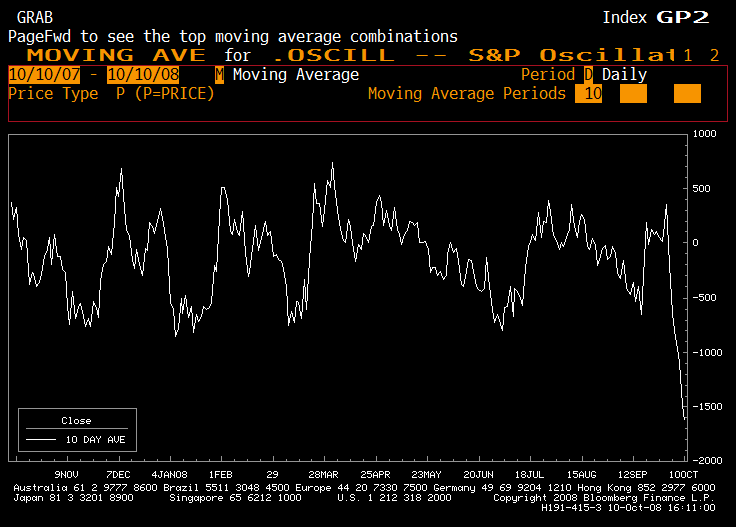Recession or Depression?
Back to the crisis.? I want to be a bull, really.? I read what Barry wrote on 10 bullish signals, and I think, yes that’s what history teaches us.? I have used that for profit in the past.? I even have a few more.
Here’s my knockoff of S&P’s proprietary oscillator:
That’s the lowest reading ever, with statistics going back to 1990.? For more, consider the discounts on closed-end funds — they are lower than ever.? Or, consider that the IPO market is closed.? Or consider that every implied volatility measure under the sun is through the roof in ways that we haven’t seen since 1987.? The yield curve of the US is wide.? Fed policy is accommodative; don’t fight the Fed.? Consider that well-respected value investors like Marty Whitman are finally excited about the market.? Credit spreads are at record highs in the money markets and in the corporate bond markets.? Finally, consider that the lack of insider transactions indicates a potentially bullish situation:
I have a hard time accepting the bullish thesis at this point because of troubles in most of the major banks, and the disappearance of all of the major investment banks.? I have a saying that when you have a major market malfunction, there tend to be many things going screwy at the same time.? I don’t like to say that it is different this time, but rather, we have to be careful whenever there is a significant hint of depressionary conditions.? If that is the case, we should see many abnormalities:
- The Treasury has shifted the TARP plan in order to recapitalize banks.? Good move, if late.
- Similar things are afoot in the UK and Germany.
- Many European banks are in trouble.
This is a global crisis, affecting most governments and firms.?? Our most severe crises, aside from the Great Depression, tended to be local, or limited to just a segment of the world.
Final notes: I warned about this disaster in advance, though I am not as prominent as a George Soros or Jeremy Grantham.?? I can dig up the references at RealMoney if necessary.? Last, as in the Great Depression, some moves by the government exacerbated the crisis, that may be true here as well.
With that, I conclude that we are back to the one key question: are we facing a recession or a depression?? If a recession, we should be buying with both hands, but if a depression, there will be better bargains later. At present, given the condition of the banks and the global scope of the problem, I lean toward the depression side of the argument, but I am not totally sold on the idea. There are bright people on both sides of the question. That said, I am not jumping to buy at present, even with many indicators that are favorable. The state of the financial system matters more.



